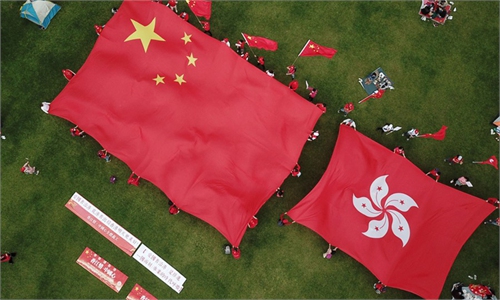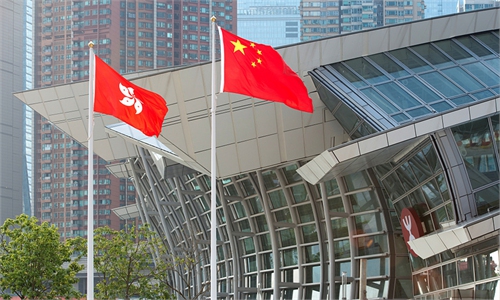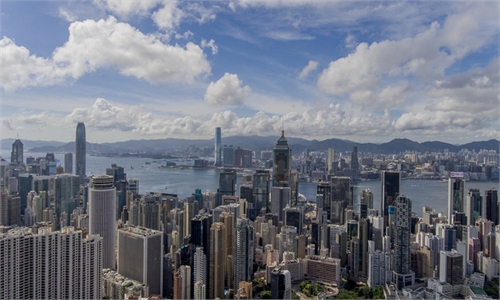With timetable unveiled for Election Committee, CE and LegCo elections, introducing electoral reform bill ‘milestone step’ in finalizing it by May
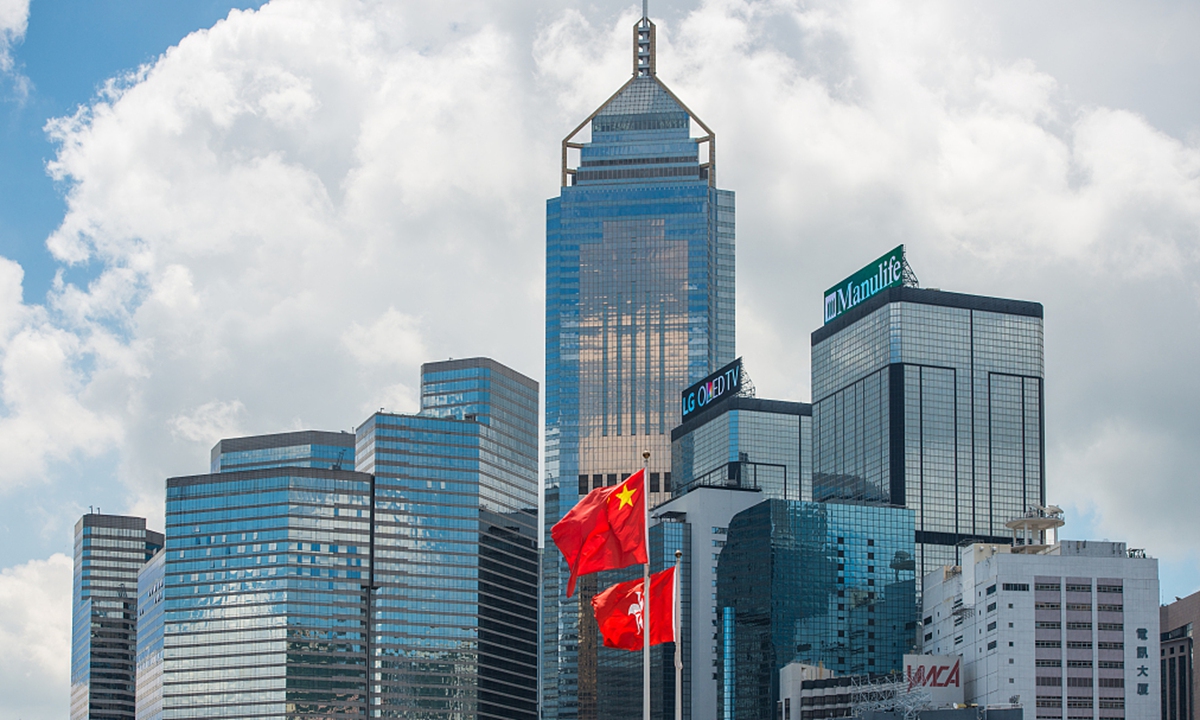
Hong Kong File Photo: VCG
The legislative body of the Hong Kong Special Administrative Region (HKSAR) will introduce an amendment bill as part of the Hong Kong electoral reform on Wednesday for the first reading and second reading of the bill, with a number of detailed amendments in key areas for the election of the chief executive, the composition of the Legislative Council (LegCo), and the Candidate Eligibility Review Committee.
Accelerating local law amendment in a comprehensive manner is in line with the Hong Kong electoral reform timetable, as all the local law overhauls are expected to be finalized before May.
Three important elections line up for the coming 12 months, with the exact dates already settled. The election for the Election Committee for set for September 19, the election for LegCo for December 19, and the election for the chief executive will be held on March 27, 2022, according to the HKSAR government.
The Executive Council of the HKSAR government has adopted the amendment bill for the electoral reform draft, which has been approved by LegCo President Andrew Leung, and the LegCo will have the first and second readings of the 500-page draft bill (the Chinese version) on Wednesday, involving in total eight main-body articles and 24 auxiliary articles, HKSAR Chief Executive Carrie Lam told a press conference on Tuesday afternoon.
After being introduced to the LegCo, the amendment bill will be proposed to the Bills Committee for scrutiny, usually after the first and second readings. Some rectification suggestions would be proposed after the reading debate, before the amendment bill is put to a vote.
Tian Feilong, an associate professor at Beihang University in Beijing, told the Global Times on Tuesday that judging from the current progress in local law amendment, the overall overhaul would be finalized by May, with no apparent forces or objections hindering this process.
After Chinese top lawmakers unanimously approved the Hong Kong electoral reform plan on March 30, the rest of the work concerning the local law amendment was left to the Hong Kong authorities to make sure the detailed reforms were in line with the amended Annex I and Annex II of the Basic Law.
For instance, the amended Annex I stipulates that the Candidate Eligibility Review Committee will be responsible for reviewing and confirming the eligibility of candidates for Election Committee members and for the office of chief executive.
Lam outlined detailed measures such as the head and two to four members of the committee being appointed by the chief executive. Further, government officials and public figures are invited to join the committee.
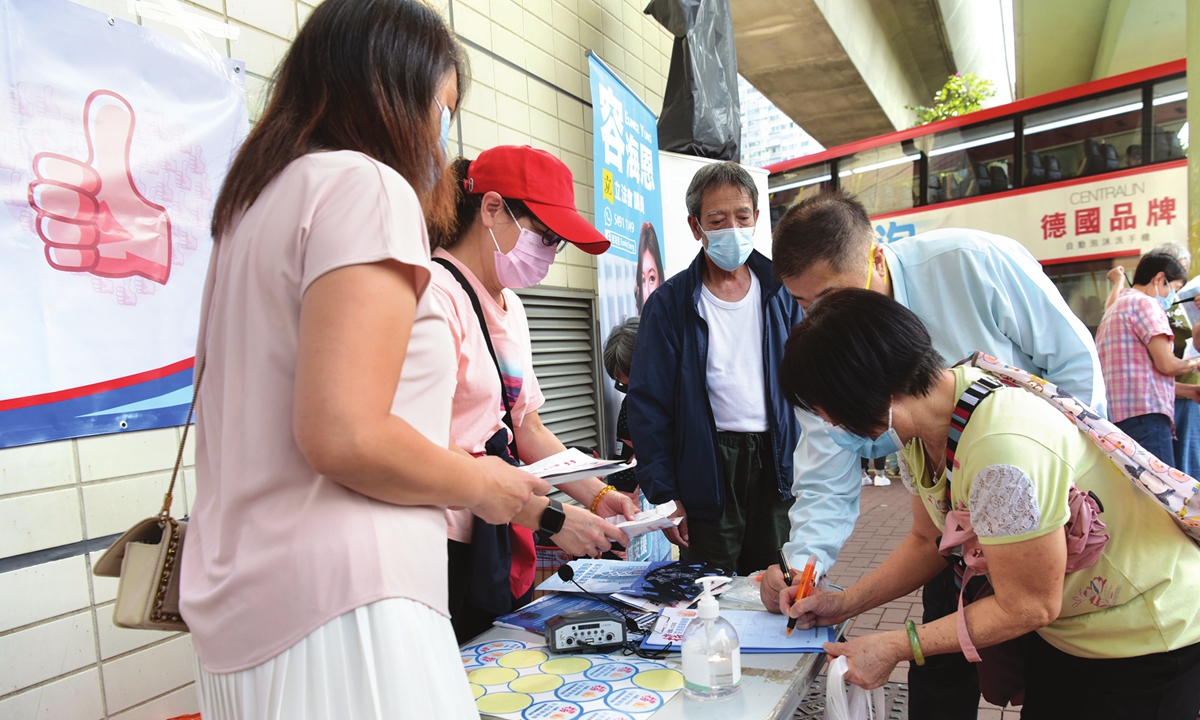
Hong Kong residents sign a petition to support the electoral reform for the city on Saturday. Tam Yiu-chung, a member of the Standing Committee of the National People's Congress and convenor of the petition, said on Sunday that, from March 11 to March 21, nearly 2.4 million people have signed the petition. Photo: VCG
While the Basic Law stipulates only major government officials are qualified to serve as members of the committee, Lam said at the press conference that she noticed some doubts in the society over the credibility of government officials holding positions as members of the review committee, so the government suggested an amendment about introducing several public figures.
It also reflected the local government's efforts to fully listen to different opinions from various sectors in order to ensure the fairness of the elections. Lam said that the directors of different departments and bureaus held a total of 117 conferences to explain to the public in the past two weeks.
With implementation of the national security law for Hong Kong and introduction of Improving the Electoral System of the HKSAR , some experts said that there have been positive signs in the city's political life, including some significant changes within moderate pan-democratic groups.
"For example, the Democratic Party recently set up a committee to study political affairs in the mainland. Further, some moderate pan-democratic groups have been trying to achieve a self-transformation in order to meet the new requirements of the electoral system," Tian said, noting that radical anti-government political figures and groups had fled or disbanded.
By introducing the oath-taking requirement as part of the major measures for the Hong Kong electoral reform, about 170,000 public servants in Hong Kong had signed their allegiance to uphold the Basic Law and swear loyalty to the HKSAR as of Monday, Secretary for Civil Service Patrick Nip said.
He also noted that all public servants are expected to take training classes on mainland affairs in the future, and they will have opportunities to have exchanges in taking positions in mainland administrative institutions and departments, according to media reports.
"It's very necessary for such exchanges between mainland officials and public servants from Hong Kong to enhance the latter's understanding of and recognition about the country," Tian said.
Other detailed reform measures include redrawing direct constituencies for LegCo to 10, and voting measures for LegCo elections.
As the local legislative body introduces the bill as milestone steps in finalizing the overhaul, Hong Kong will also soon implement a well-designed, detailed electoral system in order to meet the goal of only "patriots governing Hong Kong."

